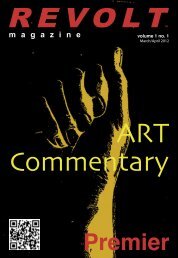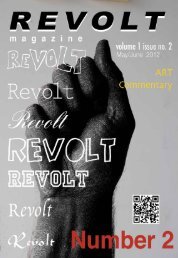Download PDF Version Revolt Magazine, Volume 1 Issue No.4
Download PDF Version Revolt Magazine, Volume 1 Issue No.4
Download PDF Version Revolt Magazine, Volume 1 Issue No.4
You also want an ePaper? Increase the reach of your titles
YUMPU automatically turns print PDFs into web optimized ePapers that Google loves.
Why is that person over there? How is it connected,<br />
how is it not connected?’ Most games have a sort<br />
of debriefing. It’s a little session when we’re all<br />
still in a circle and we’ve just finished it, and we<br />
ask, ‘How did that feel? Why?’ And then, ‘Next!’ So<br />
we’re building on thematic structure.<br />
How would you define theatre?<br />
Adam Willson: Theatre is not life. But it’s sort of<br />
like a mirror. In the sense that we look in a mirror,<br />
and we see a really essential part of our being in<br />
the mirror, even though it’s not real...So, maybe an<br />
interesting side-question is what is the difference<br />
between theatre and film. I think the main<br />
difference is that film has a much greater capacity<br />
to plumb the psychological…It’s really about<br />
perspective and playing with this perspective to<br />
get into the inner world. The depth of psychological<br />
attention in theatre is not so deep as with film.<br />
I think at the same time, there’s something<br />
immediately dynamic and important about theatre<br />
that you can’t get in film. And I think part of the<br />
theatre experience is that at the same time as<br />
getting involved and immersed in the plot or activity<br />
onstage, you always have this subliminal sense like<br />
‘I’m watching a play’ or ‘this isn’t real life.’ What’s<br />
interesting about theatre, and you can’t really do<br />
it with film, is this sort of discrepancy. And I think<br />
as an audience member watching a performance<br />
– if it’s a good performance or a challenging<br />
performance – it should be an experience of<br />
continually wrestling back and forth between these<br />
two perspectives. It’s like ‘No, this isn’t real life. I’m<br />
not totally immersed in this. I’m actually sitting in<br />
a chair.’ Wrestling with that and also with ‘yes I’m<br />
totally in this story.’<br />
How does community-based devisement<br />
engage the performers and audience?<br />
Reka: So for example it could be forum theatre,<br />
which I do a lot of as well, and that’s also based<br />
on the Theatre of the Oppressed. Forum theatre<br />
takes a long time, but we eventually get to that<br />
point where we have a beginning, middle, end –<br />
we have a climactic point…What happens is once<br />
the audience has watched the first round, the<br />
facilitators come in (in Theatre of the Oppressed,<br />
they call them Jokers) and act as communicators<br />
between the audience and the actors. Except<br />
in this case, the spectators become the ‘spectactors.’<br />
That’s the terminology for it. We take one<br />
of the major elements or themes that we were<br />
tackling in that play, and we say, ‘Raise your hand<br />
if you’ve ever identified with that or felt that.’<br />
People raise their hands, and then we ask them:<br />
‘If you were Maria or if you were Peter, or another<br />
character, what would you have done?’ Some of<br />
them are not quite sure how to process it, but<br />
they might say, ‘I would’ve told my boss to fuck<br />
off.’ Okay come on over and try it. The actors who<br />
were there continue, but they have to improvise<br />
at this point, right? Then, we clap the audience<br />
member that did that and say, ‘What changed?<br />
Has anything changed?’ So basically, it brings up<br />
a dialogue….‘Can you do that in reality? Can you<br />
tell your boss to fuck off? Can you ask for more<br />
pay?’…So the important pieces are there, but a<br />
play often ends with an ending that is realistic but<br />
not idealistic. So we’re asking a question. We don’t<br />
have an answer to what somebody could’ve done.<br />
We’re asking the audience to help us figure it out…<br />
What we’re hoping is that those solutions that were<br />
figured out we’re all going to take home and then<br />
practice them in real life. Theatre’s just a game.<br />
Photo courtesy of Frontierra Theatre Group.<br />
You can stand up to your boss in theatre, because<br />
it’s fun and ok, and nothing happens, but the point<br />
is to see if we perform these possible solutions<br />
outside.<br />
What is the sort of theatre you would like to<br />
see?<br />
Adam Willson: I’m a big fan of street theatre. I<br />
think a lot of the time it ends up not really being<br />
done the way I would like to see it. What I was<br />
talking about before how when you’re sitting in a<br />
theatre and you’re constantly wrestling with this<br />
‘am I a spectator?’ or ‘am I in the story?’ – I think<br />
the best way to specifically elicit that from an<br />
audience is to have them continually questioning<br />
their role in the situation. The sort of theatre that<br />
I would love to see is the sort of street theatre<br />
that at all times the audience is never quite sure<br />
what they’re seeing- whether it’s a play or it’s a<br />
happening, or it’s just two drunk bums spouting off<br />
nonsense, you know – and working it so that there<br />
may be points of revelation, where the audience<br />
realizes, ‘Ok, I can sort of see what’s going on<br />
now,’ and then continually work with that and try to<br />
turn that over. I would like to see more theatre on<br />
the subways, but not theatre on the subways<br />
like, ‘Hey guys, we’re going to do a play for you, like<br />
we’ve got our costumes on, we’re going to read<br />
some Shakespeare.’ Because I feel that’s a little<br />
too us-and-them, where it’s like ‘You guys are just<br />
commuters coming home from a long day of work,<br />
and we’re going to perform to you, and we’re not<br />
together in this.’ I would like to see the type theatre<br />
that we see on the subway every fucking day,<br />
performed unintentionally.<br />
What is the world climate like for social<br />
theatre?<br />
Reka: The US is very resistant. It’s hard for me to<br />
judge, because I’m very new to the US. I’ve only<br />
been here for two years. But I’ve heard that it’s<br />
very underrepresented, that it’s still at its startup<br />
stage. There are for instance in New York two<br />
masters degrees in social theatre – but one is a 5<br />
year program and one is only a two year program –<br />
at CUNY and NYU. NYU is more focused on theatre<br />
and education, so it’s more institutionalized, more<br />
in a school setting. When I say ‘social theatre’,<br />
for one, it’s like ‘Oh, what is that?’ But also, it’s<br />
like ‘Oh, you mean a teaching artist.’ It’s hard to<br />
explain that no, it’s not that. With the UK, you can<br />
say that it’s like the motherland of many social<br />
theatre companies. It’s very well-funded there, it’s<br />
very well-recognized, and usually you don’t really<br />
have to explain what it is. Practitioners such as my<br />
self get hired by various companies, non-profits, or<br />
NGOs working on certain issues and needing that<br />
branch of the work. I think that’s really important,<br />
because within the educational structure, it’s very<br />
limited: you have theatre, but you don’t really have<br />
the social theatre branch in the US.<br />
What do you think of political theatre?<br />
Adam Willson: I’m pretty skeptical of an<br />
intermingling between any one of the arts and<br />
politics. Obviously the arts have their roots and<br />
orientation and motivation in building a community,<br />
especially theatre. And so that’s political in the<br />
Aristotelian sense of political. At the same time, I<br />
think what people mean by political theatre – it’s<br />
basically using theatre to express a non-artistic<br />
platform. It can be more or less explicit. When it’s<br />
very explicit – it’s like the same thing where you<br />
go to a play and the whole play, the characters are<br />
shouting. After a certain moment, the audience<br />
is going to stop paying attention. I think the same<br />
thing happens when theatre is too sermonizing. I<br />
think the most effective theatre educates you in<br />
something that you weren’t aware of before, but<br />
it does it in a disguised way. So, it’s not preaching





